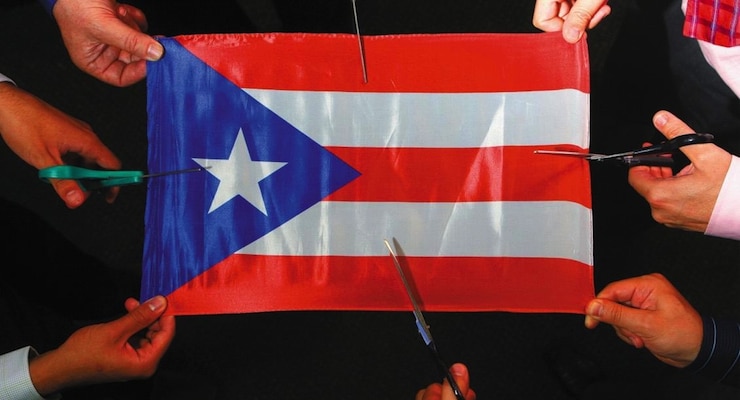

Flag of Puerto Rico. (Photo: Getty)
The TV ads flash the noble faces of American retirees and urge Washington to help protect their savings. The back story is kept rather vague. It’s that many older people invested in Puerto Rican bonds. The U.S. territory’s economy is in deep crisis, and it has begun defaulting on this debt.
The question here: What prompted ordinary investors to put their savings into Puerto Rican bonds? But first let’s look at who is running the ads.
No, the retirees haven’t pooled their Social Security checks to make their case. These ads are being run by hedge funds and other big Wall Street players who made their own bad bets on Puerto Rico’s debt. They are now hiding behind the average Joes to press Washington for a bailout.
The obvious solution to this crisis is to let the island restructure its debt under U.S. bankruptcy rules — alongside a federal oversight board that would keep a close eye. States are allowed to declare bankruptcy, but as a U.S. territory, Puerto Rico needs congressional approval first. A bankruptcy would not cost the U.S. taxpayer anything.
This approach would also be the most humane. The setbacks for investors pale next to the trauma being suffered by Puerto Ricans. The island’s government has already raised taxes and cut spending on social services to the bone. Thousands, meanwhile, are fleeing to the U.S. mainland.
Turning the language around, the big financial interests are now calling the bankruptcy route a “bailout.” It’s not the first time they’ve forgotten the clause in capitalism saying that when an investment goes sour, the investors are expected to lose money.
Many average buyers of Puerto Rican bonds didn’t quite know what they were getting into. The bonds may have been rated as fairly safe at the time, but they were not something to put in a drawer and forget about.
In 2012, Morningstar issued a warning after the rating agency Moody’s downgraded Puerto Rico’s general obligation debt to just above junk bond level. “Moody’s does not believe that Puerto Rico enjoys the same level of fiscal stability as any of the official 50 states,” Morningstar wrote. “Even lowly Illinois GO debt is rated firmly within the investment-grade spectrum at A2.”
Study after study shows that the general public poorly understands the nature of risk. Small investors scooped up Puerto Rican bonds because they offered higher yields than U.S. municipal bonds and were exempt from local, state and federal taxes. When an investment with super tax advantages offers an unusually good yield, there’s a reason: It comes with risk.
Again we see the limitations of the “ownership society,” the doctrine that Americans should be managing their own money for retirement rather than relying on Social Security to send monthly checks.
Remember President George W. Bush’s push to let workers direct some of their Social Security taxes to stock funds and other privately run accounts? Skeptics questioned whether ordinary Americans had the expertise, but Bush assured them in fatherly fashion that he wouldn’t let them do crazy things with their money. There would be a list of acceptable investment vehicles.
Fortunately, the plan never got off the ground. In 2008, the market tanked, humbling the most conservative stocks alongside the high fliers. One shudders to think of the pitchfork parades that would have descended on Washington had people lost significant sums on their privatized Social Security accounts.
Yes, we should all save and invest, albeit with great care. At the same time, let us give thanks for boring old Social Security. It’s something to fall back on, just in case.






